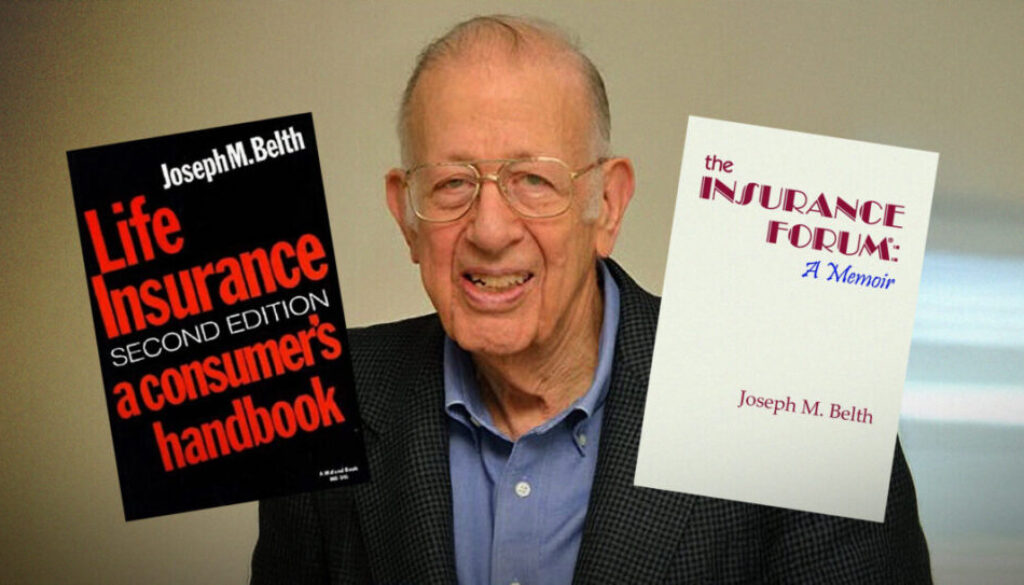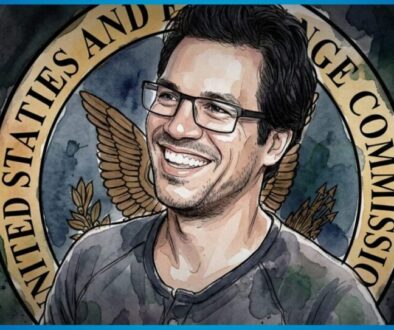‘We lost a great one’: longtime life insurance educator Joe Belth dies at 95

Dick Weber first encountered Joe Belth in 1979 after a Million Dollar Round Table presentation in which Weber stated that “fewer than 1% of all term insurance is in force at the time of death.”
The ever-inquisitive Belth quickly reached out to Weber, then a successful life agent and currently president of The Ethical Edge, Inc. By that point, Belth had been researching, writing and editing his The Insurance Forum monthly publication for more than five years.
“He wanted to know where I had gotten that statistic,” Weber recalled Wednesday. “He wasn’t challenging the veracity; he just wanted me to quote my sources. That challenge helped me become more diligent about verifying sources.”
It would also begin a decades-long correspondence between the two men. Weber is just one of many life insurance industry titans who respected and relied on Belth’s persistent research over his 70-year career.
Belth, 95, died Saturday.
“Joe was thoughtful, diligent, and fiercely dedicated to getting to the substance and truth of any insurance issue,” Weber said. “I’ve had a number of mentors throughout my 58-year career in the life insurance industry, but none as rewarding or over such a long period of time as the relationship with Dr. Joseph Belth.”
Started at the bottom
Belth held degrees from Auburn (N.Y.) Community College (now Cayuga Community College), Syracuse University, and the University of Pennsylvania. At Penn he was a fellow of the S. S. Huebner Foundation for Insurance Education.
He got his start in the business on the ground floor, working as a life insurance agent for Continental American Life Insurance in Syracuse for five years in the 1950s. The 1960s saw Belth transition to insurance education.
He became a professor of insurance at Indiana University in 1962 and would teach there for decades. About 12 years later, the first copies of The Insurance Forum fanned out across the industry.
The idea grew out of 31 “incidents of censorship by insurance trade magazines, professional journals, and professional organizations” over an eight-year period, Belth would explain. His “sole objective” was to create a vehicle that would allow him “to communicate with individuals and organizations in the insurance business without censorship.”
Issue No. 2, from February 1974, featured such headlines as: “The Plight of Manhattan Life’s Substandard Policyholders,” “What Fidelity Union Life is Doing to College Students,” and “A Conflict-of-Interest Situation for College Professors.”
And Belth was off and running. He edited the publication for its entire 40-year run and authored Life Insurance: A Consumer’s Handbook (1973, revised in 1985), The Insurance Forum: A Memoir (2015).
“We lost a great one,” said Larry Rybka, chairman and CEO of Valmark Financial Group in Akron, Ohio.
Life as a blogger
Belth spent the last act of his long career writing steady blog posts at his eponymous site. Starting in October 2013, Belth wrote roughly one post a week, sometimes more, on the biggest issues facing the life insurance industry, with an occasional non-industry book review mixed in.
Belth tackled long-term care pricing, stranger-owned life policies, annuity exchanges and other controversial topics. Executive salaries were a consistently favorite subject and Belth published as many details as he could get.
George Pickett first heard of Joe Belth when he spoke at Pickett’s chartered life underwriting conferment in Bryn Mawr in 1972. Like many others, Pickett would exchange periodic communications with Belth for decades to follow.
“He was viewed by companies as a pain in the butt because he asked hard questions in the interests of policyholders, and he put companies in print either answering or not answering his hard questions,” said Pickett, principal at The Centerpoint Group, a Flowood, Miss., financial firm.
As Belth and his wife Marjorie aged, he would often use their experiences with life insurance and retirement and the basis for a blog post. The couple owned nine life insurance policies and the “Age 100 Problem” fueled some of Belth’s best late-life writing.
Belth sought to answer whether a policyholder would incur a large income tax obligation if he survived to the policies’ terminal age of 100 and received the face amount himself. As was typical of his academic approach to problems, Belth presented the question to the CEOs of 20 different life insurance companies and reported on the nine responses he received.
He later conducted similar surveys and incorporated the Belths’ situation into his blog posts on the topic. The couple celebrated their 70th wedding anniversary in June.
“We are in our 80s. The cash values are getting close to the face amounts,” Belth wrote in an Oct. 15, 2018 post. “Therefore, because the protection component of each policy (the face amount minus the cash value) is small, we now have little protection. We no longer need the protection, but we need to plan for the disposition of the policies.”
‘Joe Belth didn’t mess around’
Sheryl Moore, CEO of Moore Market Intelligence and Wink, Inc., also identified Belth as a mentor and “the ultimate researcher” in the life insurance business.
“Anyone who received that peach-colored newsletter each month knew that Joe Belth didn’t mess around,” she said in a Tuesday LinkedIn tribute. “He found all of the ugly things in life insurance and exposed them.”
For The Insurance Forum, Belth received a George Polk Award in 1990 in the “special publications” category. He received the 2017 John Newton Russell Memorial Award in recognition of a lifetime of professional excellence, service to the life insurance and financial planning industry, and commitment to ethical conduct.
“Dr. Belth has dedicated more than 50 years of his life to providing high-quality insurance education to the American public,” said Paul Dougherty, then-president of the National Association of Insurance and Financial Advisors. “During that time, he has also given back to our great industry by volunteering his time, insights and energy.”
For one of his books, Participating Life Insurance Sold by Stock Companies, he received the 1966 Elizur Wright Award for outstanding original contribution to the literature of insurance. He received a 1999 Huebner Gold Medal for distinguished service to education and professionalism.
© Entire contents copyright 2025 by InsuranceNewsNet.com Inc. All rights reserved. No part of this article may be reprinted without the expressed written consent from InsuranceNewsNet.com.
The post ‘We lost a great one’: longtime life insurance educator Joe Belth dies at 95 appeared first on Insurance News | InsuranceNewsNet.





